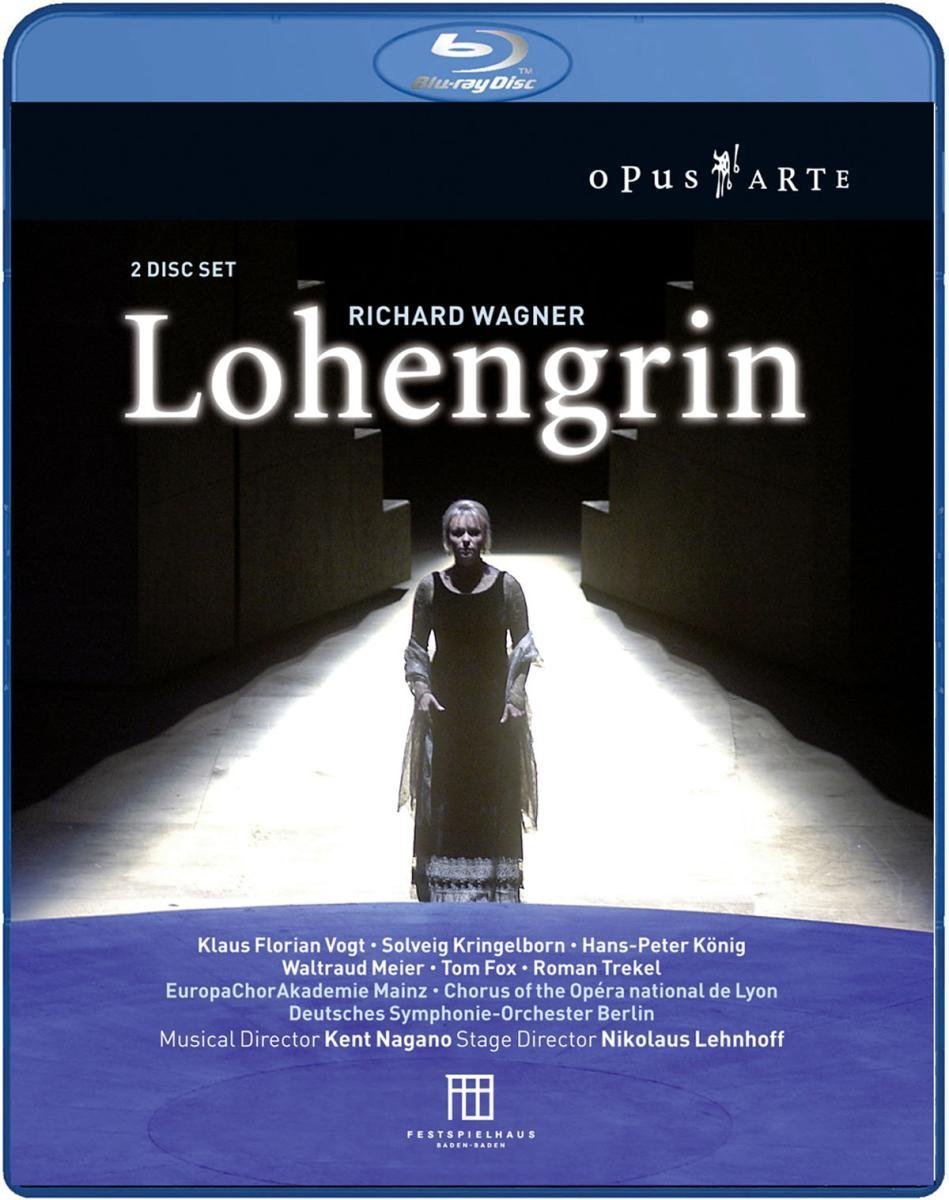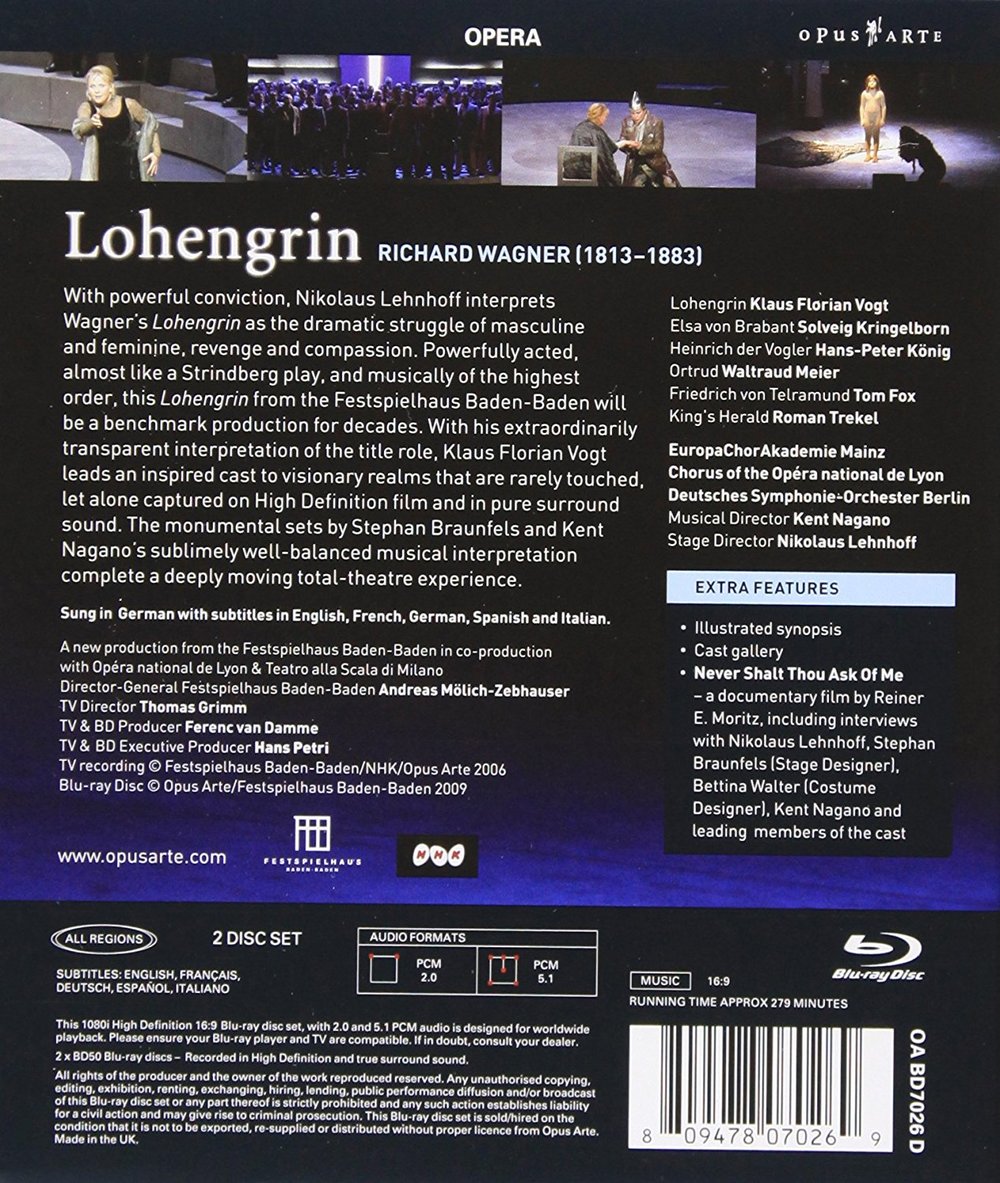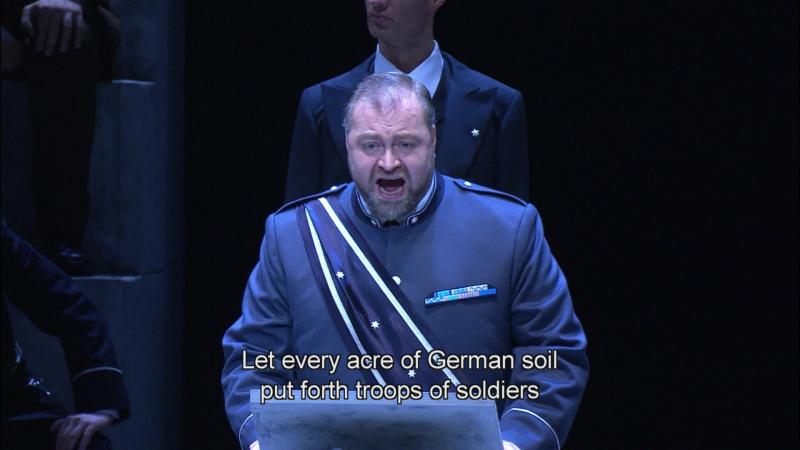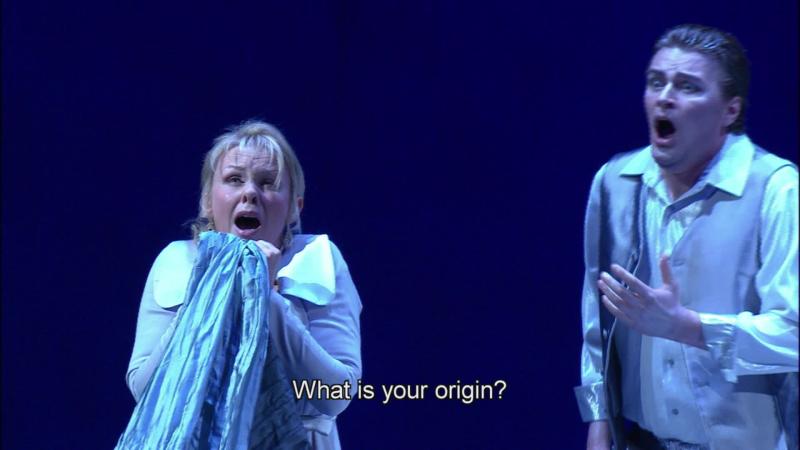

Wagner Lohengrin opera to libretto by the composer. Directed 2006 by Nikolaus Lehnhoff at the Baden-Baden Festspielhaus. Stars Klaus Florian Vogt (Lohengrin, Knight of the Grail, son of Parsifal), Solveig Kringelborn (Elsa von Brabant, daughter of the ruler of Brabant), Hans-Peter König (Heinrich der Vogler, King of Germany), Tom Fox (Friedrich von Telramund, Count of Telramund), Waltraud Meier (Ortrud, a pagan sorceress, wife of Friedrich), Roman Trekel (King's Herald), Markus Ahme, Volker Neitmann, Dominik Hosefelder, Michael Dries (Brabantine nobels), Pei-Min Yu, Sharona Applebaum, Marie-Lys Langlois, Corinne Marquet (Pages) and Thore Vogt (Duke Gottfried, Elsa's brother). Kent Nagano conducts The Deutsches Symphonie-Orchester of Berlin, the EuropaChorAkademie Mainz (rehearsed by Joshard Daus), and the Chorus of the Opéra national de Lyon (rehearsed by Alan Woodbridge). Sets by Stephan Baunfels; costumes by Bettina Walter; lighting by Duane Schuler; choreography by Denni Sayers. Directed for TV by Thomas Grimm; produced by Ferenc van Damme with executive producer Hans Petri. Sung in German. Released 2009, discs have 5.1 PCM sound. Grade: A+
In an unknown time the Germans were once again threatened by horrors from the East (now the Hungarians!). King Heinrich der Voglar (King Henry the Fisher) calls on his allies for mutual defense. But in Brabant, there is uncertainty about the succession to the deceased ruler, and Heinrich (Hans-Peter König) must straighten things out:
Friedrich von Telramund (Tom Fox) is the local strongman. He's a cousin of the dead King and is second in line to succession:
He is also married to Ortrud (Waltraud Meier). She is of the original pagan people of Brabant and is a sorceress who worships the old Gods:
But first in succession to the throne is the dead King's daughter, Elsa. To get rid of her, Friedrich, at Ortrud's instigation, claims that Elsa killed her brother the Prince:
The case is unclear on evidence, so Heinrich orders a trial by single combat. But none of the Brabantine nobels are willing to fight Telramund. Will Elsa lose her life by default? She has seen a vision of a Knight in Shining Armour, and asks the king to publicly call for him 3 times. The King is in a hurry, but he must comply:
Everyone is astonished when a boat is seen approaching land pulled by a swan. In the boat is the Knight (Klaus Florian Vogt) of Elsa's dream:
The silver Knight declares that Elsa is a maiden in distress whom he will defend. Further, he promises to marry her, become King, and lead the people into battle against those Hungarians. But there is an odd condition. Elsa must take an oath to never ask him for his name, his origin, or where he came from:
You must swear to never ask:
Elsa agrees. The silver Knight defeats Telramund, but spares his life, which he hopes will be devoted to repentance:
Act 2. The loss in battle is a huge setback for Telramund. But he is not the brains in this operation. Ortrud immediately begins to plot her counterattacks and prays to her ancient Gods:
Ortrud knows that no woman could sustain a marriage to a mystery:
Ortrud begs Elsa for forgiveness:
Then Ortrud offers sisterly advice: "Could you but comprehend the wondrous origins of this man. " Then . . . :
But Elsa has faith, at least for now:
Elsa approaches the church to marry the silver Knight:
When Ortrud turns on her in fury mocking Elsa for her marriage to a mystery:
And Telramund, who has been banished on pain of death, shows tremendous courage by creating a huge scene in front of King Heinrich and all the people. A trial by combat must be decided by God. If magic were brought into play, it would be a blasphemy that would invalidate the trial:
But the people line up behind the silver Knight. Elsa is the only person with the right to ask the Knight for his ID:
Now we head into Act 3. The prelude to Act 3 includes "Here comes the bride." This has been the most popular wedding processional music in the Western world now for maybe 100 years +. I wonder how many of those millions of brides were aware of how short and painful Elsa's marriage would be. Here the couple has just entered the honeymoon suite. While Elsa stands around, the groom (now an alter-ego of Richard Wagner) has gone to work on a new composition. This is not what grooms are supposed to do. Note the weird piano. The short strings (that make the high notes) are on the left side of the instrument. So the left hand, which has always played the bass notes in Western music, will now play the treble.
Elsa has come up with several clever rationalizations to learn her husband's name without breaking her oath:
But the bride and groom are not communicating. Finally, exasperated, Elsa asks:
Now the end comes quickly for Telramund, Elsa, and the silver Knight. King Heinrich must look for new allies. But to find about this, and other surprises, I suggest you watch the opera.
Perhaps it took you 3 1/2 minutes to read my comments on this story above. It takes about 3 1/2 hours to view the whole opera. But it doesn't drag for a minute. Wagner wrote a gripping libretto that maybe could have been worked up into a stage play. Then he wrote beautiful music all of which is immediately accessible to any spectator. Critics say that Lohengrin was Wagner's last "regular opera" basically written in bel-canto-like style (Abbate and Parker, History of Opera, 2nd & Updated Edition 2014 at page 298). After Lohengrin Wagner would launch into his more demanding "music dramas" beginning with Der Ring and ending with Parsifal.
Lohengrin is full of sub themes: light and dark, good and evil, West vs. East, man vs. woman, Christianity vs. Paganism, and white magic vs. black magic. As director Nikosaus Lehnhoff states in the disc booklet, "Strindberg's existentialism and Freud's psychoanalysis are more closely related to the inner core of the drama of Lohengrin than are the national revanchism of imperial Germary, or the cult of the Führer during the Nazi period, to the outer frame of the opera's historical spectacle."
Well, in a PS screenshot, I offer a snippet of text that suggests yet another sub theme that surely Wagner never anticipated. At the final assembly of the people, King Heinrich asks, "Where is he whom God send to make Brabant great again." This sounds oddly familiar. I'm an American, and we just finished an election for our new President that was won by a candidate undertaking to "Make America Great Again." This new silver Knight hasn't yet taken the oath of office. But already I wonder. Did we as an electorate really find out what is his name, whence has he journeyed, and what is his origin?
Everything about this production is splendid in the Blu-ray version even though it was recorded in 2006. So this titles gets an A+.
OR
























